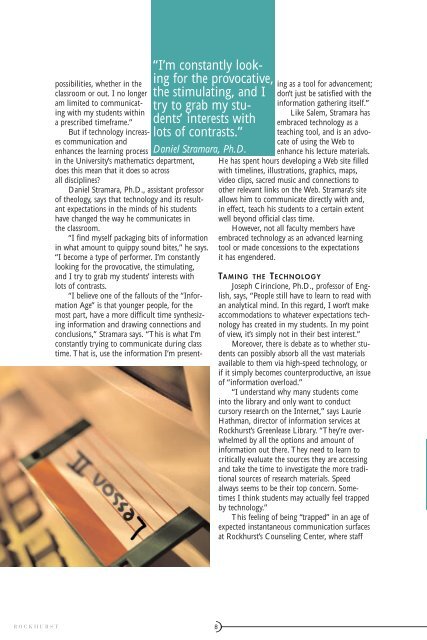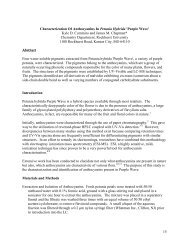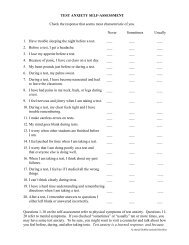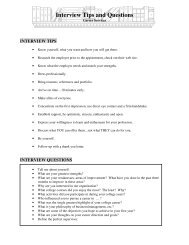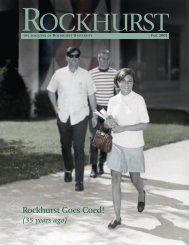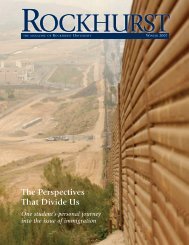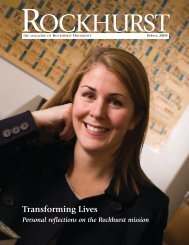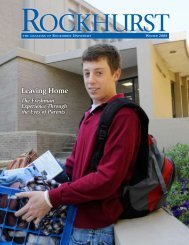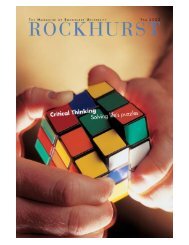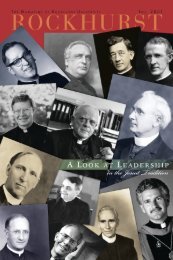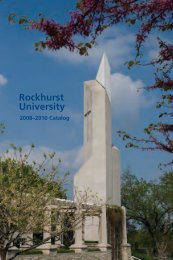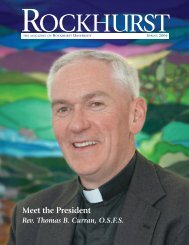Being Human - Rockhurst University
Being Human - Rockhurst University
Being Human - Rockhurst University
- No tags were found...
Create successful ePaper yourself
Turn your PDF publications into a flip-book with our unique Google optimized e-Paper software.
possibilities, whether in theclassroom or out. I no longeram limited to communicatingwith my students withina prescribed timeframe.”But if technology increasescommunication andenhances the learning process“I’m constantly lookingfor the provocative,the stimulating, and Itry to grab my students’interests withlots of contrasts.”Daniel Stramara, Ph.D.in the <strong>University</strong>’s mathematics department,does this mean that it does so acrossall disciplines?Daniel Stramara, Ph.D., assistant professorof theology, says that technology and its resultantexpectations in the minds of his studentshave changed the way he communicates inthe classroom.“I find myself packaging bits of informationin what amount to quippy sound bites,” he says.“I become a type of performer. I’m constantlylooking for the provocative, the stimulating,and I try to grab my students’ interests withlots of contrasts.“I believe one of the fallouts of the “InformationAge” is that younger people, for themost part, have a more difficult time synthesizinginformation and drawing connections andconclusions,” Stramara says. “This is what I’mconstantly trying to communicate during classtime. That is, use the information I’m presentingas a tool for advancement;don’t just be satisfied with theinformation gathering itself.”Like Salem, Stramara hasembraced technology as ateaching tool, and is an advocateof using the Web toenhance his lecture materials.He has spent hours developing a Web site filledwith timelines, illustrations, graphics, maps,video clips, sacred music and connections toother relevant links on the Web. Stramara’s siteallows him to communicate directly with and,in effect, teach his students to a certain extentwell beyond official class time.However, not all faculty members haveembraced technology as an advanced learningtool or made concessions to the expectationsit has engendered.TAMING THE T ECHNOLOGYJoseph Cirincione, Ph.D., professor of English,says, “People still have to learn to read withan analytical mind. In this regard, I won’t makeaccommodations to whatever expectations technologyhas created in my students. In my pointof view, it’s simply not in their best interest.”Moreover, there is debate as to whether studentscan possibly absorb all the vast materialsavailable to them via high-speed technology, orif it simply becomes counterproductive, an issueof “information overload.”“I understand why many students comeinto the library and only want to conductcursory research on the Internet,” says LaurieHathman, director of information services at<strong>Rockhurst</strong>’s Greenlease Library. “They’re overwhelmedby all the options and amount ofinformation out there. They need to learn tocritically evaluate the sources they are accessingand take the time to investigate the more traditionalsources of research materials. Speedalways seems to be their top concern. SometimesI think students may actually feel trappedby technology.”This feeling of being “trapped” in an age ofexpected instantaneous communication surfacesat <strong>Rockhurst</strong>’s Counseling Center, where staffROCKHURST8


